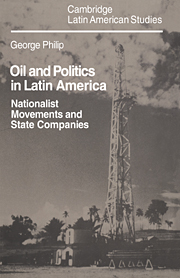Book contents
- Frontmatter
- Contents
- List of tables
- Preface
- Glossary
- Abbreviations
- Note on currencies and other units of measurement
- Maps: Latin America in 1920, 1940, 1960 and 1981; showing importing countries, exporting countries and countries self-sufficient in oil
- Introduction: The politics of oil in twentieth-century Latin America
- Part I The world oil environment
- Part II The major expropriations
- 7 Politics and the concession contract
- 8 Argentina: YPF, Yrigoyen and the 1935 oil law
- 9 Some nationalisations of the 1930s: Chile, Uruguay, Bolivia
- 10 Cárdenas and the Mexican oil nationalisation
- 11 The formation of Petrobrás
- 12 The nationalisation of the ipc in Peru
- 13 The nationalisation of Gulf Oil in Bolivia 1969
- 14 Oil politics in Ecuador 1972–6
- 15 The nationalisation of oil in Venezuela
- 16 Oil companies and governments in twentieth-century Latin America
- Part III The state oil companies
- Notes and bibliography
- Index
- CAMBRIDGE LATIN AMERICAN STUDIES
11 - The formation of Petrobrás
Published online by Cambridge University Press: 23 December 2009
- Frontmatter
- Contents
- List of tables
- Preface
- Glossary
- Abbreviations
- Note on currencies and other units of measurement
- Maps: Latin America in 1920, 1940, 1960 and 1981; showing importing countries, exporting countries and countries self-sufficient in oil
- Introduction: The politics of oil in twentieth-century Latin America
- Part I The world oil environment
- Part II The major expropriations
- 7 Politics and the concession contract
- 8 Argentina: YPF, Yrigoyen and the 1935 oil law
- 9 Some nationalisations of the 1930s: Chile, Uruguay, Bolivia
- 10 Cárdenas and the Mexican oil nationalisation
- 11 The formation of Petrobrás
- 12 The nationalisation of the ipc in Peru
- 13 The nationalisation of Gulf Oil in Bolivia 1969
- 14 Oil politics in Ecuador 1972–6
- 15 The nationalisation of oil in Venezuela
- 16 Oil companies and governments in twentieth-century Latin America
- Part III The state oil companies
- Notes and bibliography
- Index
- CAMBRIDGE LATIN AMERICAN STUDIES
Summary
The great depression set in motion a train of events which completely transformed the Brazilian economy. The past 50 years have been a period of rapid industrial growth while other sectors of the economy have also maintained a considerable momentum. This industrial growth and the consequent rise in oil consumption have brought the question of oil on to the political agenda in a way quite unknown in Brazil before 1930. Moreover, in the years after 1930 there developed two tendencies whose interaction was largely to determine the course of Brazilian politics and which were to take on new and important forms during the course of the post-1945 oil debate. On the one hand, there was the gradual development of a centrally directed technocratic state, as successive governments came to concern themselves increasingly with the pursuit of industrial development. On the other, the process of urbanisation and industrialisation generated possibilities of popular mobilisation and opportunities for radical politicians. Nowhere was the uneasy compromise between these two more clearly revealed than during the debate over Petrobrás.
In the years before 1930, and for some time afterwards, there was no oil issue. In 1930 Brazil's oil industry was almost classically underdeveloped. Oil consumption was less than a third of that of Argentina, less than one half of that of Mexico and oil made up less than 10% of Brazilian imports.
- Type
- Chapter
- Information
- Oil and Politics in Latin AmericaNationalist Movements and State Companies, pp. 227 - 242Publisher: Cambridge University PressPrint publication year: 1982



